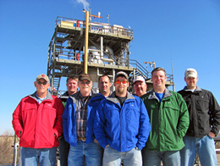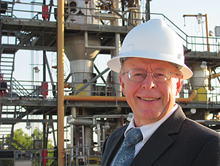Executive Summary
 Fractionation Research, Inc. (FRI) is a non-profit research consortium supported by over 70 organizations, including many of the world's s largest petroleum, chemical, and engineering companies. The experimental unit is located on the Oklahoma State University campus in Stillwater, Oklahoma.
Fractionation Research, Inc. (FRI) is a non-profit research consortium supported by over 70 organizations, including many of the world's s largest petroleum, chemical, and engineering companies. The experimental unit is located on the Oklahoma State University campus in Stillwater, Oklahoma.
At the heart of the FRI experimental facility are two commercial-scale low and high pressure distillation columns along with the equipment needed to support their operation. The auxiliary equipment includes low and high pressure kettle reboilers, low and high pressure condensers, as well as a dedicated boiler and cooling water tower. The low pressure column has the capability to operate from a deep vacuum, while the high pressure column can operate at up to 500 psia. Each column has a 4 foot (internal diameter) by 28 foot section, but the low pressure column also has a section that is 8 feet in diameter and 12 feet high. Each column is equipped with a permanent, automated gamma ray scanner that measures liquid holdup density during the experimental runs. Strategically positioned windows on the columns allow technicians to look inside and even take video. The FRI facility also has viewing windows on one of its kettle reboilers, a feature not available anywhere else in the world. In addition, cross connections between the two columns allow the sharing of some auxiliary equipment and the parallel operation of both reboilers and condensers while the low pressure column is operating. From 2007 to 2009, the experimental unit was refurbished and debottlenecked, and has since been demonstrated to be capable of testing the full range of hydraulic capacity of all known column internal contact devices.
At this FRI facility, process control and data capture were handled by a Yokogawa Micro-XL DCS, and this has recently been replaced with a CENTUM CS 3000 system, also from Yokogawa. At the same time, FRI introduced Yokogawa's Exapilot operator support package and Exaquantum historian. FRI conducts many experiments throughout the year, and Exapilot has enabled this facility to achieve faster and safer start-ups and shut-downs, and has also helped improve another key parameter: time to steady state. This has reduced steam consumption. By providing operators real-time process data at the right time, Exaquantum helps them make quick decisions at every stage of a process.
The Challenges and the Solutions
(1) Smooth and safe start-up and shut-down
FRI normally has about 20 different test operations a year. Each test may last about two to three weeks. To minimize steam consumption, FRI needs to start up the unit quickly, smoothly, and safely. And when a test is completed, the operator has to shut down the unit smoothly and safely.
Exapilot is used to build and execute electronic, semi-automatic procedures using a modular procedural automation (MPA) methodology. Yokogawa and FRI engineers programmed Exapilot for start-ups, transitions, and shut-downs. The software is capable of providing control room technicians with all of the following:
- A step-by-step listing
- Prompts regarding next steps
- Warnings regarding next steps
- Initiation of the actual opening and closing of valves or changes at controller set-points, one at a time in sequence or more than one at the same time
- Performance of "watchdog" function for critical events
- A record of completed steps
- Status information on process changes
When the Yokogawa and FRI staff members first started working together, the learning curve was steep. The Yokogawa people needed to learn the two distillation columns, the three binary systems, and the steps associated with the starts, transitions, and stops. Fortunately, up-to-date and accurate PFDs and P&IDs were available, and these proved to be an essential asset. The FRI people needed to learn the software's capabilities and master electronic procedure building.
Several semi-automatic procedures were written. None were completely perfect when initially tested in the control room. It was very easy, however, to run a computer program in parallel with process changes, in offline mode, without handing over complete control to the computer program. FRI's best board operators were in the control room during these trial runs and had a hand in perfecting the program. With this program running under Exapilot, there is now uniformity in how starts, changes, and stops are executed.

CENTUM CS 3000 integrated with Exapilot and Exaquantum
(2) Easy data management
FRI needs to collect a lot of data from a test operation and analyze it as quickly as possible. Before Exaquantum was introduced, operators had to enter figures in a spreadsheet and then wait at least three hours to see the results of the distillation test. With Exaquantum, the process data is updated every second and displayed in a trend display along with a summary. At a glance, operators can verify the test situation and take immediate action. Data visualization is the key, giving operators a complete understanding of what is going on in the process, in real time.
In summary, the integrated use of the CENTUM CS 3000 DCS, Exaquantum, and Exapilot has reduced steam consumption and improved safety at the FRI test facility by facilitating the execution of non-routine operations.
Customer Satisfaction
According to Mike Resetarits, a technical director, "Manpower reduction is not one of the goals of semi-automatic procedures. In too many global control rooms, manpower reductions have already occurred. Additionally, many senior technicians have retired over the last 10 years. Semi-automatic procedures are intended to help, not eliminate, the present generation of technicians." He continues, "These days, in the FRI control room, the FRI technicians seem to enjoy using the semi-automatic procedure software. It collaborates, for them, their recollections, judgments, and decisions regarding next steps. They say, 'It's like having our best board "man" alongside us in the control room all of the time.'"

Unit operators are happy to use Exapilot and Exaquantum

Mike Resetarits, Technical Director
Industrieën
-
Downstream olie & gas
De downstream olie- en gasindustrie wordt de laatste jaren met een toenemend aantal uitdagingen geconfronteerd. Deze omvatten de veranderende kenmerken van de te verwerken grondstoffen, veroudering van procesinstallaties en apparatuur, stijgende energiekosten, gebrek aan geschoolde fabrieksoperators die een raffinaderij veilig en efficiënt kunnen leiden en de steeds veranderende eisen van zowel de markt als de klant.
In de loop der jaren is Yokogawa een samenwerkingsverband aangegaan met vele downstream bedrijven om industriële oplossingen te bieden die gericht zijn op het oplossen van deze uitdagingen en problemen. Yokogawa's oplossingen hebben plantmanagers geholpen om maximale winstgevendheid en duurzame veiligheid binnen hun fabrieken te realiseren.
-
Refining
In de steeds veranderende markt worden raffinaderijen niet alleen gezien als installaties voor de verwerking van ruwe olie, maar moeten ze ook rendement opleveren. Tegelijkertijd is men zich bewust van de noodzaak van veiligheid in dergelijke installaties. Een totale productieoplossing die planning, beheer en controle omvat, is vereist om de lange termijn doelstellingen inzake rentabiliteit, efficiëntie en milieubescherming te bereiken. Met jarenlange expertise op het gebied van automatisering kan Yokogawa u betaalbare totaaloplossingen bieden voor efficiëntere productie en een schonere wereld.
Gerelateerde producten & oplossingen
-
Procedural Automation (Exapilot)
Procedural Automation (Exapilot) provides a flexible methodology to capture, optimize and retain procedural knowledge in a process plant while meeting requirements in reliability, flexibility, and lifecycle costs.
-
Gedistribueerd besturingssysteem (DCS)
De DCS maakt automatisering en controle van industriële processen en verbeterde bedrijfsprestaties mogelijk. Meer dan 10.000 fabrieken vertrouwen op Yokogawa DCS om hun productiedoelen te bereiken.
